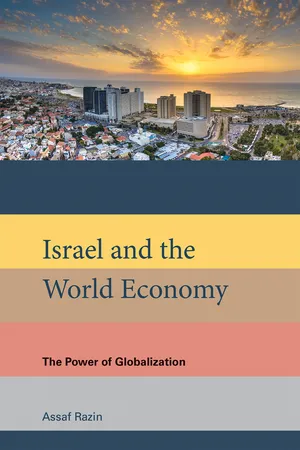
- English
- ePUB (mobile friendly)
- Available on iOS & Android
About this book
Anti-globalization sentiments are rising, especially in Europe and the United States, with the increasingly integrated global economy blamed for domestic economic distress. In this book, Assaf Razin argues that Israel offers a counterexample to this view, showing decisively positive economic effects of globalized finance, trade, and immigration. He offers a rigorous analysis of the role played by globalization in key episodes in the remarkable development of the Israeli economy. His findings may hold lessons for productivity-challenged advanced economies as well as for other countries such as China currently making the transition to fully developed economies.
Razin examines the wave of immigration after the collapse of the Soviet Union, as highly skilled Soviet Jews migrated to Israel and the effect on income inequality; the Great Moderation of inflation and employment in advanced economies, as Israel's inflation converged in parallel with low world inflation rates; Israel's robustness in the face of the deflation shocks of the 2008 financial crisis; and technology transmission through foreign direct investment, reinforcing Israel's high-tech sector surge. He also considers such ongoing challenges as high fertility and low labor market participation and the economic costs of the Israeli-Palestinian conflict.
Frequently asked questions
- Essential is ideal for learners and professionals who enjoy exploring a wide range of subjects. Access the Essential Library with 800,000+ trusted titles and best-sellers across business, personal growth, and the humanities. Includes unlimited reading time and Standard Read Aloud voice.
- Complete: Perfect for advanced learners and researchers needing full, unrestricted access. Unlock 1.4M+ books across hundreds of subjects, including academic and specialized titles. The Complete Plan also includes advanced features like Premium Read Aloud and Research Assistant.
Please note we cannot support devices running on iOS 13 and Android 7 or earlier. Learn more about using the app.
Information
Table of contents
- Cover
- Title Page
- Copyright Page
- Dedication
- Table of Contents
- Preface
- Epigraph
- Prologue
- I: Historical Background
- II: Globalization, Disinflation, High Tech, and Foreign Direct Investment
- III: Trending Developments
- IV: Early Literature
- Epilogue
- References
- Index